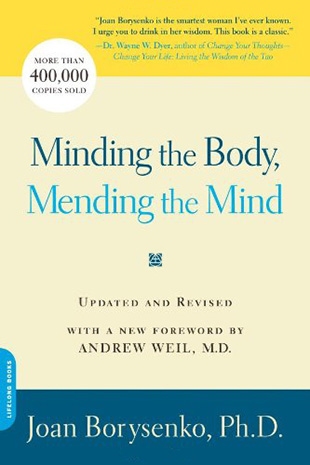Here is an updated and revised version of a 1987 bestseller by Joan Borysenko which Andrew Weil describes in the foreword as "an inspiring explanation of what it means to be fully human — present in each moment with an open mind and an open heart." He adds that this may be "one of the best definitions of well-being and what it means to live your best life."
Although the average person knows a lot about exercise, diet, supplements and the like, more than 70 percent of all cancers, greater than 80 percent of all heart disease, and over 90 percent of type 2 diabetes are related to unhealthy lifestyles. Borysenko, the author of 13 books, states that the gap between what we know and how that translates into taking care of our health has its origin in our sorry emotional state. The three most predominant emotions which have a large impact on both our physiology and health are depression, anxiety, and chronic anger.
In a chapter titled "The Science of Healing," Borysenko alludes to our habit of "awfulizing," a term coined by cognitive psychologist Dr. Albert Ellis; it means the tendency to escalate a situation into its worst possible conclusion. Anyone raised in a household where this behavior was present knows how hard it is not to make mountains out of molehills. Another stumbling block in well-being is chronic helplessness. The author believes that stress-hardy persons can use the three Cs to cope with change: they are commitment, control, and challenge.
Stress can be seen as a spiritual teacher rather than a threat. Borysenko presents steps to take to become aware of how to mind the body. She demonstrates the relaxation response through meditation, breathing, and stretching exercises. Further steps are taming the mind and learning how to live in the present moment rather than to be enslaved to memories of the past or fears about the future. In an incisive chapter on mind traps, she covers:
• Personal put downs
• The "Shoulds"
• Anger and blame
• Rationalization
• Disillusionment
• Despair
Mending our minds is no easy affair:
"Old ways of thinking exert incredible force on our awareness, distorting reality as it's actually unfolding in the moment. Human beings learn by association and repetition and find it difficult to drain the charge out of old beliefs and habitual patterns of reaction that have a lifetime of voltage in them. Old patterns are like riverbeds. You can build a dam, reeducate the flow of the river, and lead it in a new direction, but an unusually heavy rain can easily overwhelm the dam, leaving the river to rush back to its familiar course."
One creative way of escaping from old habit patterns is to try the art of reframing which can involve humor, affirmations, hypnosis, dreams, creativity, and visualization. Borysenko also deals with healing the emotions with commentary on regrets and resentments, letting go of guilt, seeing attackers as teachers, dealing with old business, and practicing forgiveness. She notes: "Whether you are healthy or sick, young or old, rich or poor, you can still be happy and optimize your physical function. That's what minding the body and mending the mind are all about."
